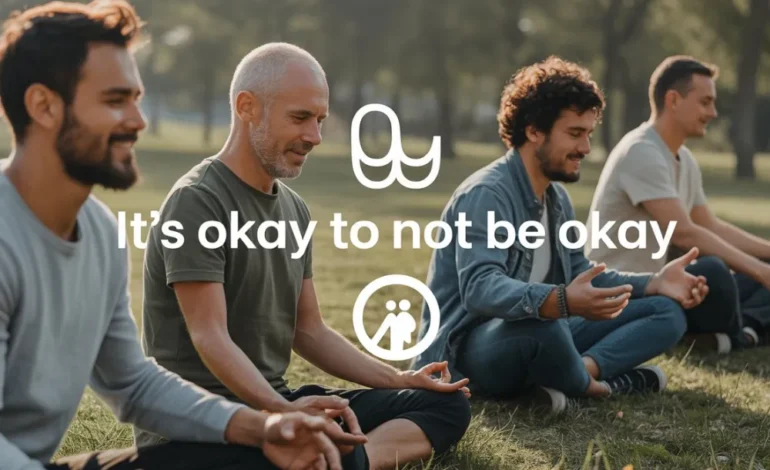Introduction
When we talk about health, we often think of physical fitness, hitting the gym, eating right, or getting enough sleep. But there’s another health side that’s just as important: mental health. For many men, this topic has been hidden behind walls of silence for too long. That’s why Men’s Mental Health Month matters so much today; it’s about breaking those walls, opening conversations, and creating real change.
Why We Need Awareness Now More Than Ever
Mental health challenges affect everyone, regardless of age, career, or background. But statistics show men are often less likely to seek help for mental health issues than women.
Because in many cultures, men are taught to tough it out, man up, or deal with it. These attitudes lead to silence, shame, and sometimes, tragic outcomes. Men’s Mental Health Month aims to change this mindset by spreading awareness and encouraging men to talk openly about their struggles.
For example, a report by mental health organisations shows men are three times more likely to die by suicide than women in many countries. These numbers highlight the urgency of addressing men’s emotional well-being today, not tomorrow.
A Story That Brings It Home
Let me share a quick story.
A friend of mine, John, was always the life of the party, funny, confident, the guy everyone loved to be around. But what we didn’t know was that John was battling anxiety and depression behind closed doors. It wasn’t until Men’s Mental Health Month came around that he attended a workplace seminar on stress management.
That seminar became his turning point. He reached out to a counsellor, started therapy, and slowly rebuilt his mental well-being. Today, John often shares his story to inspire other men to seek help early.
Stories like John’s show why awareness months like this matter. They give men permission to talk, share, and heal.
Breaking the Stigma Around Men’s Mental Health

One of the biggest barriers men face is stigma. Many grow up hearing things like:
- Real men don’t cry.
- Be strong. Don’t show weakness.
- Deal with it yourself.
These beliefs create emotional walls. Men start thinking that seeking help is a sign of failure, rather than strength. But the truth is, asking for help shows courage.
During Men’s Mental Health Month, campaigns, workshops, and social media movements work to break these harmful stereotypes. They remind everyone that mental health is just like physical health; when something feels off, you deserve care, not criticism. You can also check Deion Sanders’ Health.
Step-by-Step: How to Support Men’s Mental Health
Awareness is important, but action changes lives. Here’s a simple, step-by-step guide to support men’s mental health, during this month and beyond:
1. Start With Open Conversations
Begin by asking simple, caring questions like, How are you really doing, Then listen without judgment. Sometimes, just knowing someone cares makes all the difference.
2. Learn the Warning Signs
Be aware of common signs of emotional distress, such as:
- Withdrawal from friends or family
- Sudden mood changes
- Trouble sleeping
- Loss of interest in hobbies
- Increased use of alcohol or drugs
The earlier these signs are recognised, the sooner help can be offered.
3. Share Helpful Resources
Many men don’t know where to start when seeking help. Share mental health hotlines, online counselling platforms, and local support groups. During Men’s Mental Health Month, many organisations offer free or discounted mental health resources; take advantage of them.
4. Encourage Professional Help
Therapists, counsellors, and psychologists are trained to help. Encourage men to reach out, reminding them it’s okay to ask for guidance.
5. Promote Healthy Habits
Exercise, balanced nutrition, and enough sleep all play a big role in emotional well-being. Even simple changes, like walking outdoors for 15 minutes a day, can improve mood and reduce stress.
6. Use Technology for Mental Health
Today, many apps offer guided meditation, mood tracking, and therapy sessions from home. A tool like [Your Product Name] can provide 24/7 access to resources, helping men take small, private steps toward better mental health.
A Personal Anecdote: The Change Is Possible
Another story worth sharing is about Ahmed, a father of three. He was juggling a demanding job, family responsibilities, and financial worries. Over time, he became irritable, withdrawn, and sleepless. His wife suggested counselling, but he hesitated, he thought therapy was “not for men.,
Then, during Men’s Mental Health Month, his workplace organised a mental wellness workshop. He joined reluctantly, but it changed his life. Hearing other men talk about their struggles made him realise he wasn’t alone. Soon after, he booked his first therapy session. Today, Ahmed says it was the best decision he ever made. You can also check the health diagnosis solution.
How Men’s Mental Health Month Benefits Everyone

When men receive mental health support, the benefits spread far and wide:
- Families become stronger because emotionally healthy fathers, brothers, and husbands can connect better with loved ones.
- Workplaces become healthier – reducing stress leads to better productivity and teamwork.
- Communities become safer – emotional well-being reduces the risk of violence, substance abuse, and self-harm.
By caring about men’s mental health, we create healthier societies overall.
Taking the First Step: How to Get Started
If you’re wondering how to begin, here’s a quick action plan:
- Educate yourself – Read articles, watch videos, or join webinars on men’s mental health.
- Talk about it – Start conversations with friends, family, or coworkers.
- Use available tools – Apps, books, or wellness journals can help track emotions and manage stress.
- Join events during the month – organisations host mental health awareness walks, seminars, and campaigns.
- Support products that help – Tools like [Your Product Name] offer practical, private ways to improve mental wellbeing with confidence.
Why Buying the Right Product Matters
Mental health products, whether apps, journals, or therapy platforms, make it easier to take small steps toward emotional well-being.
When you invest in tools like [Your Product Name], you get:
- Convenience – Access help anytime, anywhere.
- Privacy – Seek support without worrying about judgment.
- Confidence – Know you’re using trusted, professional resources.
During Men’s Mental Health Month, many companies offer discounts or free trials. It’s the perfect time to take that first step.
FAQs
Why is Men’s Mental Health Month important?
It matters because many men hesitate to seek help due to social pressure or fear of judgment. This month reminds everyone that mental health care is essential, normal, and available.
How can I support Men’s Mental Health Month?
You can start by talking openly about mental health, sharing resources like hotlines or counseling services, attending awareness events, or supporting mental health organizations.
What are some common signs of mental health struggles in men?
Look for withdrawal from family or friends, changes in mood, trouble sleeping, loss of interest in hobbies, or increased use of alcohol or drugs.
Where can men find help for mental health concerns?
Men can reach out to mental health hotlines, licensed therapists, online counseling platforms, or local support groups offering safe spaces for emotional support and guidance.
Conclusion
Men’s Mental Health Month isn’t just about awareness; it’s about action, compassion, and lasting change. It gives men permission to talk about their struggles, seek help without shame, and invest in tools that support their well-being.
If you or someone you care about is struggling, remember: help is out there. From professional counselling to simple mental wellness products like [Your Product Name], solutions exist to make the journey easier and more effective.
When we prioritise men’s mental health, we build stronger families, better workplaces, and healthier communities. So let’s use Men’s Mental Health Month as the start of a movement where mental well-being becomes a priority for everyone—not just today, but every day—with support from platforms like Chillwavez that encourage open conversations and emotional wellness.







